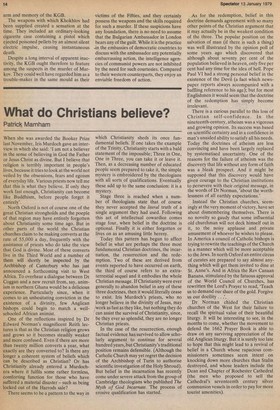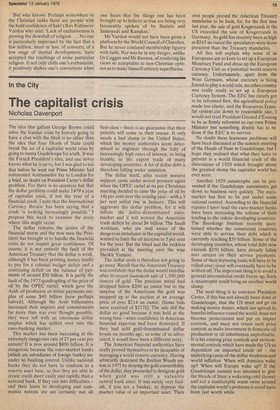What do Christians believe?
Patrick Marnham
When she was awarded the Booker Prize last November, Iris Murdoch gave an interview in which she said: 'I am not a believer in the sense of believing in God the Father or Jesus Christ as divine. But I believe that religion is terribly important in people's lives, because it tries to look at the world not veiled by the obsessions, fears and egoism of everyday life. Various priests now tell me that this is what they believe. If only they work fast enough, Christianity can become like Buddhism, before people forget it entirely'.
North Oxford is not of course one of the great Christian strongholds and the poeple of that region may have entirely forgotten about Christianity some time ago. But in other parts of the world the Christian churches claim to be making converts at the rate of 55,000 a day, frequently with the assistance of priests who do take the view that God is divine. Most of these converts live in the Third World and a number of them will shortly be inspected by the Archbishop of Canterbury who has just announced a forthcoming visit to West Africa. To overhear a dialogue between Dr Coggan and a new recruit from, say, animism in northern Ghana would be a delicious experience. Particularly since, when it comes to an unhesitating conviction in the existence of a divinity, few Anglican bishops could begin to match a wellschooled African animist.
One of the reflections inspired by Dr Edward Norman's magnificent Reith lectures is that as the Christian religion grows and grows so it becomes steadily weaker and more confused. Even if there are more than twenty million converts a year, what exactly are they converted to? Is there any longer a coherent system of beliefs which can be described as Christian? Or has Christianity already entered a Murdochera where it fulfils some rather formless, comforting function for those who have suffered a material disaster — such as being locked out of the Harrods sale?
There seems to be a pattern to the way in which Christianity sheds its once fundamental beliefs. If one takes the example of the Trinity, Christianity starts with a bald statement of the impossible; Three in One, One in Three, you can take it or leave it. Then, as a decreasing number of educated people seem prepared to take it, the simple mystery is embroidered by the theologians with all sorts. of qualifications. Eventually these add up to the same conclusion: it is a mystery.
Stage three is reached when a number of theologians state that of course they never accepted the literal truth of a single argument they had used. Following this act of intellectual cowardice comes stage four, when belief in the doctrine is optional. Finally it is either forgotten or lives on as an amusing little heresy.
Today this pattern has begun to affect belief in what are perhaps the three most fundamental Christian doctrines, the incarnation, the resurrection and the redemption. Two of these are derived from events reported to have occurred on earth, the third of course refers to an extraterrestial sequel and it embodies the whole Christian message. If Christianity were ever generally to abandon belief in any of these three doctrines, then it would literally cease to exist. Iris Murdoch's priests, who no longer believe in the divinity of Jesus, may /work as fast as they like, but nothing they do can assist the survival of Christianity, since, be they ever so splendid, they are no longer Christian priests.
In the case of the resurrection, enough factual evidence has survived to allow scholarly argument to continue for several hundred years, but Christianity's traditional position remains defensible. (Although the Catholic Church may yet regret the decision of the Archbishop of Turin to authorise scientific investigation of the Holy Shroud). But belief in the incarnation has recently come under severe attack from the group of Cambridge theologians who published The Myth of God Incarnate. The process of erosive qualification has started. As for the redemption, belief in this doctrine demands agreement with so many other points of the Christian argument that it may actually be in the weakest condition of the three. The popular position on the salvation of man (if there is such a thing) was well illustrated by the opinion poll of some years ago which discovered that although about seventy per cent of the population believed in heaven, only five per cent had any time for the idea of hell. Pope Paul VI had a strong personal belief in the existence of the Devil (a fact which newspaper reports always accompanied with a baffling reference to his age); but for most Englishmen it would seem that the doctrine of the redemption has simply become irrelevant.
There is a curious parallel to this loss of Christian self-confidence. In the nineteenth-century, atheism was a vigorous and growing opinion. Its success was based on scientific certainty and in a confidence in man's unaided ability to satisfy all his needs. Today the doctrines of atheism are less convincing and have been largely replaced by systematised uncertainty. One of the reasons for the failure of atheism was the discovery that life without any form of faith was a bleak prospect. And it might be supposed that this discovery would have given courage to the Christian institutions to persevere with their original message, in the words of Dr Norman, 'about the worthlessness of all earthly expectations.'
Instead the Christian churches, seemingly at the very moment of victory, have set about dismembering themselves. There is no novelty so gaudy that some influential old churchman will not deck himself out in it, to the noisy applause and private amusement of whoever he wishes to please. In America a council of Catholic bishops is trying to rewrite the teachings of the Church in a manner which will be more acceptable to the Jews. In north Oxford an entire circus of curates are prepared to say almost anything which will get them invited to dine at St. Anne's. And in Africa the Rev Canaan Banana, stimulated by the fatuous approval of the World Council of Churches, has rewritten the Lord's Prayer to read, 'Teach us to demand our share of the gold. Forgive us our docility .
Dr Norman chided the Christian churches of the West for their failure to recall the spiritual value of their beautiful liturgy. It will be interesting to see, in the months to come, whether the movement to defend the 1662 Prayer Book is able to draw on any surviving appreciation of the old Anglican liturgy. But it is surely too late to hope that this might lead to a revival of belief in a Church whose rapacious commissioners sometimes seem intent on knocking down more churches than Stalin destroyed, and whose leaders include the Dean and Chapter of Rochester Cathedral (the men who proposed to sell the Cathedral's seventeenth century silver communion vessels in order to pay for more tourist amenities). But who knows. Perhaps somewhere in the Christian ranks there are people with the bold confidence of Saki's Rev Poltimore Vardon who said: 'Lack of exclusiveness is proving the downfall of religion. . . No one is particularly impressed by the fact that a few million, more or less, of converts, of a low stage of mental development, have accepted the teachings of some particular religion. It not only chills one's enthusiasm, it positively shakes one's convictions when one hears that the things one has been brought up to believe as true are being very favourably spoken of by Buriats and Samoyeds and Kanakas.'
Mr Vardon would not have been given a platform by the World Council of Churches. But he never confused membership figures with faith. Nor was he in any danger, unlike Dr Coggan and Mr Banana, of rendering his views so acceptable to non-Christian opinion as to make himself entirely superfluous.



































 Previous page
Previous page